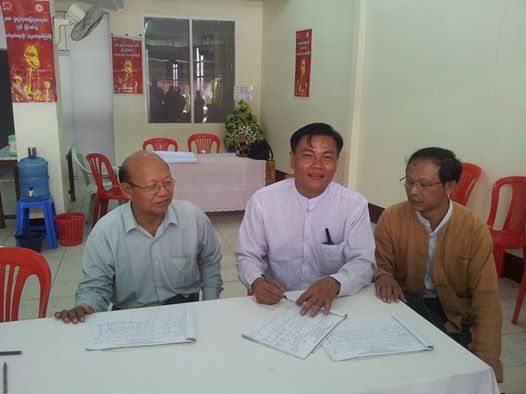Civil society leaders Nay Myo Zin and Win Cho were released from Insein Prison on Tuesday, having spent 84 days locked up for organising an unauthorised demonstration in downtown Rangoon.
In January, the activists led hundreds of farmers in a march to Rangoon City Hall, calling for the release of jailed demonstrators, constitutional reform, and the establishment of a farmers’ union. Nay Myo Zin and Win Cho were then arrested for breaching Article 18 of the Peaceful Assembly and Peaceful Processions Law, which stipulates that protests must be organised with permission from the authorities.
On Wednesday, Nay Myo Zin, an ex-army general and now two-time political prisoner, used his first day of freedom to lead his Myanmar Social Development Network (MSDN) to the opposition National League for Democracy (NLD) party headquarters in Rangoon. There, both parties signed a petition calling on the parliament to repeal Article 436 of the 2008 Constitution, which retains military veto over any proposed amendments.
“Today, I went to the NLD head office to sign the 436 movement petition,” Nay Myo Zin told DVB on Wednesday. “I went with all our Myanmar Social Development Network Members. All our members came to support by signing it here.”
The MSDN works to provide impoverished communities with sustainable community facilities and education programmes, and has primarily focused on promoting the rights of rural communities.
However, after his prison sentence, Nay Myo Zin says he is turning his attention to national politics. The activist, who previously found himself in hot water for sporting Aung San Suu Kyi merchandise, is advocating for multilateral discussions including the NLD leader, the ruling Union Solidarity and Development Party, the military and ethnic parties.
“I’m collecting other members of civil society groups to support us in a request for our Myanmar government to hold a four party meeting, a four party movement of the government, the commander of the army, Daw Aung San Suu Kyi and other party leaders as well as ethnic leaders.”
[related]
Nay Myo Zin highlighted the recent closure of the Mahasantisukha Monastery and the deposition of religious minister Hsan Hsint as “complex problems” which require multilateral national level discussions to be resolved.
Two weeks ago, police and the government-backed State Sangha Maha Nayaka, the highest order of Buddhist monks in the country, shut the doors of Mahasantisukha monastery in a midnight raid. The ownership of the temple is disputed between the politically active Penang Sayadaw and the state commission itself. Five monks arrested in the raid stood trial for “defaming religion” before they were released on bail and re-ordained.
Shortly after, Religious Affairs Minister Hsan Hsint lost his job for his alleged mishandling of the situation.
“We need to solve political deadlocks peacefully,” the activist said. “So we are asking the government to convene this four-way dialogue.”
Nay Myo Zin’s release comes as amendments are being made to the law under which he was detained.
Passed in 2011, the Peaceful Assembly and Peaceful Processions Law previously allowed for the staging of public demonstrations in Burma under the provision that rallies should receive government permission. An amendment was approved by the parliament, and the changes uphold the requirement for demonstrators to achieve permission, yet oblige officials to grant permission unless they can provide “valid reasons” for a refusal. The maximum jail term for those who stage a protest without permission has been reduced from one year to six months.



